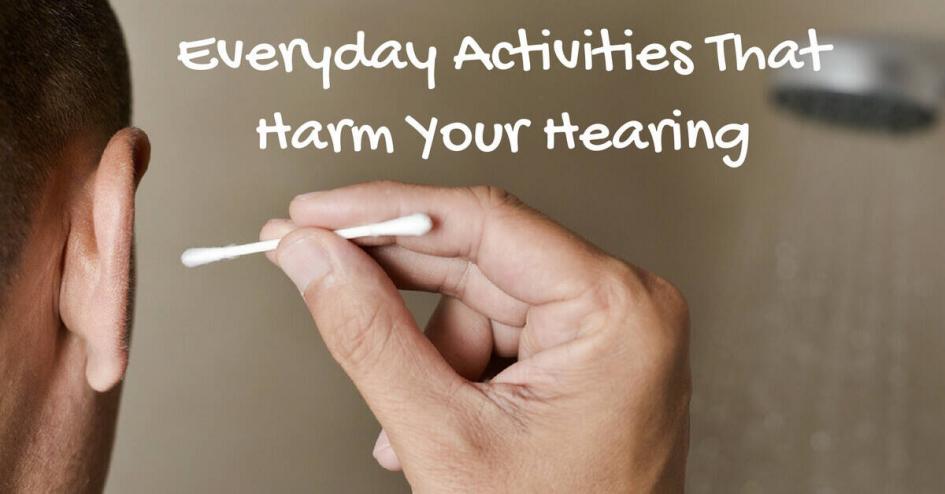
Everyday Activities That Harm Your Hearing
Mar 12, 2018
Work hard, play hard. This ubiquitous phrase is a mantra for many of us today, who feel an increasing pressure to ‘do it all,’ both at work and in our leisure time. The problem is that this kind of fast-paced lifestyle can leave little room for thinking about our health, including the health of our ears. According to a recent study by Oticon--a leader in advanced audiology and hearing aid technology--four out of ten UK adults are potentially harming their hearing on a daily basis, and one-third of UK adults don’t take any steps to protect their ears in loud environments.
Millions of Brits endanger their hearing on a daily basis
Researchers found that many adults do not consider the effect that their leisure-time activities could be having on their ears. Almost half of UK adults listen to music at a loud volume, and 28 percent of respondents said they do this on a daily basis. One out of five respondents said the noise level of their workplace (and the fact that they do not use hearing protection) could be damaging their ears. Going to loud concerts, parties, and sporting events were the activities most commonly reported as causing noticeable effects on their hearing. The new study also revealed a shocking fact: one fifth of UK adults already suffer from hearing loss, and 21 percent experience tinnitus--a ringing, buzzing or roaring sound heard in the ears. This condition can be a source of stress, anxiety and depression, especially if it is untreated. To recap the main findings of the study: -19 percent of UK adults have hearing loss; 21 percent suffer from tinnitus -Four in ten UK adults freely admit they risk their hearing -One in five UK adults don’t consider the impact of loud noises on their hearing -One in three UK adults don’t take ANY precautions in the presence of loud noisesThough hearing loss symptoms are common, exams are rare
The Oticon-commissioned study of 2,000 UK adults also revealed that nearly three quarters of respondents had never gone to a hearing care professional for a hearing exam. Even those who struggled to hear in noisy environments had hesitated to go in for a hearing check. Undiagnosed and untreated hearing loss can lead to isolation by limiting a person’s ability to interact in public places, and to enjoy their favorite activities. Thomas Behrens, Head of Audiology at Oticon, said: ‘Avoiding social situations is a very common outcome of hearing loss. Hearing loss does not only affect the ability to hear sound, it also puts a strain on the brain as it tries to interpret meaning in words, organise sounds, orient sound direction and refocus, especially in noisy environments such as restaurants’. Isolation as a result of hearing loss often has negative mental health consequences, such as difficulty concentrating, increased depression and stress. Fifty-one percent of the study respondents stated they ‘occasionally’ have trouble hearing what others are saying to them, and a staggering 41 percent said they often need to ask people to speak up or repeat themselves. Around half of those with hearing loss said they find it tiring to try to understand others in the presence of background chatter. About one third of respondents stated that they felt worried about their hearing and have noticed their hearing is becoming worse as they get older.How do UK adults feel about hearing aids?
The study showed that when it comes to hearing loss treatment, many adults are still concerned about a negative stigma. Hearing aids are often perceived as bulky, noticeable and only for older people, when in fact they are smaller, sleeker and more high-tech and adaptable than ever before. -22 percent of UK adults feel they should have their hearing checked by a hearing care professional. -32 percent of respondents with hearing loss symptoms stated that they haven’t even considered getting hearing aids. -Of the respondents who have thought about trying hearing aids, 22 percent said would feel too self-conscious wearing them. -17 percent of respondents with hearing loss would be concerned about the size of the hearing aid, and 14 percent dislike the idea because they view them as a sign of getting old.Ways to protect your hearing
- Always bring your earplugs! Keep them in a convenient place and don’t leave the house without them. Remember to put them in when the volume becomes noticeably too loud. Keep in mind, they only work if properly fitted in the ear canal
- Use ear defenders for children as it can be difficult to properly fit ear plugs
- Stay a safe distance from noisy loudspeakers
- Be sensible when listening to music on a personal music player (A good rule of thumb: if a person an arm’s length away has to shout for you to hear them, your music is too loud.)
- Download an app help you measure the sound level at concerts, in the workplace, or in other high-decibel situations if you feel the noise level may be harmful.
House of Hearing
If you think or know that you are experiencing hearing loss, please contact one of our team members. We are on hand to answer any questions you may have and can provide you with a hearing consultation or a fitting for your hearing aids. House of Hearing offers hearing care at five centres in Edinburgh, Galashiels, Perth, Morpeth, and St Andrews. Call us on 0131 220 1220 for more information.Our Clinics
All House of Hearing clinics are in town centre locations and accessible to public transport and parking. Home visits also available if mobility is an issue.


.png)
.png)
.png)

.png)
